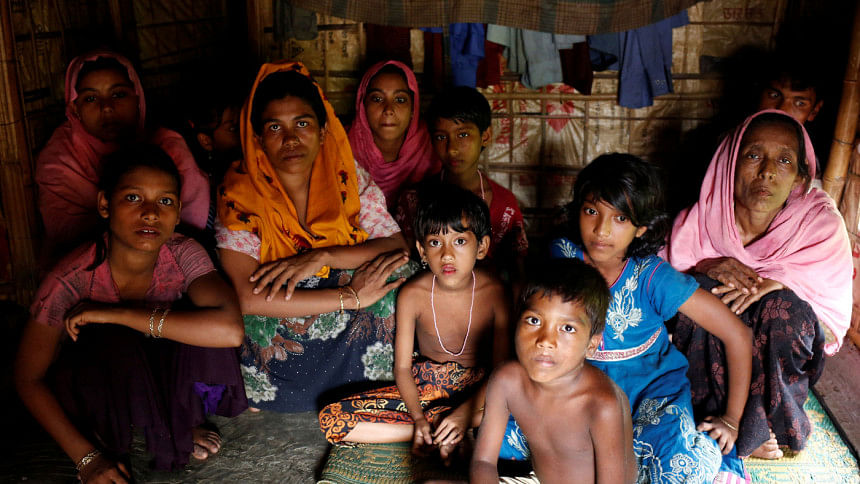How radio is playing a vital role for Rohingya women

In this era of digital media, radio has become akin to a novelty—considered a "cool" medium of entertainment that inspires nostalgia, but not so effective in terms of circulating information. Other media such as online portals offer information faster and in far more intriguing formats. The radio, however, still functions as a vital tool for humanitarian communication.
In December last year, we, the writers of this article, conducted research on the effectiveness of radio as a communication tool in Rohingya refugee camps, and found that radio has a unique ability to serve the refugees with information—83 percent of our respondents said they prioritise radio for information over entertainment. Radio is the most accessible and therefore most important medium of information dissemination for almost 100 percent of the women we interviewed. It provides both life-saving information as well as content which helps create awareness among the people in one of the most vulnerable communities of the world.
On August 25 this year, Bangladesh observed the third anniversary of providing shelter to more than 800,000 Rohingya refugees. Providing electricity and mobile network in the densely crowded refugee camps is not a viable option for the Bangladesh government given that the entire area is hilly, remote, and subject to considerations of national security. So access to television is limited, and mobile SIM cards and internet are banned. Radio, therefore, is one of the most effective communication tools for them, especially for women who have restrictions placed on their movement and have very low literacy rates. Radio allows these women to listen to vital information in a safe and friendly space. They're also able to access invaluable content relating to maternal and child care.
Ongoing wars, conflicts and tensions around the world are causing women and children to become particularly vulnerable demographics. Through a survey of 50 families in the Rohingya camps, we found that radio contents about maternal and child health care are listened to by most female respondents—a large portion of the population inside camps are either children or women who are pregnant. A 45-year-old mother-in-law of a young woman shared that most of the newly married women are too young to know about maternal health care, and "listener clubs" aired by radio stations serve the same role as schools for them. Another mother-of-two emphasised the importance of docu-dramas on radio, sharing that these encourage their children to adopt healthy habits such as washing hands. Meanwhile, most of the male respondents prefer listening to news on the medium.
A good number of the women stressed that radio informs them about the legal support offered by camp authorities against domestic violence. The audio-dramas about child and women's safety encourage them to approach local authorities if and when they face such kind of violence. "In our community, our husbands are free to get married more than once and leave us with the children. Camp-in-charge (CIC) officers informed us through radio-transmitted news that we can now complain to the CIC office if such things happen to us. In fact, we are obligated by Bangladeshi law to do so," listener club respondents shared.
Seventy-eight percent of respondents said they believe entirely the information they hear on the radio, while 18 percent said they believe the information partially. Among them, 98 percent of female respondents entirely trust the authenticity of information offered by radio—this number is lower among male respondents, which appeared to have some negative effects. In 2019, for instance, a malicious rumour had spread about Rohingya children being stolen and killed in the name of God to make the largest bridge in Bangladesh. This rumour was spread through Facebook, and Rohingya men were found to have had access to and faith in social media—more than in radio—at the time. Government officials failed to combat the rumour because Rohingya men simply did not believe that the radio content was more authentic than the content circulating through social media.
Despite the influence of radio among women in refugee camps, a focus group discussion with influential people from the camps revealed that some of them do not approve of women having access to information through radio. Some believe that since women are not allowed to join in or share their opinion in the public sphere or even make family decisions in most cases, it is pointless for them to have access to information. Accepting the fact that radio stations provide health-related information to women who most need it, the FGD respondents argued that women are unable to understand the value of other important news related to local and world politics, therefore more men should be provided with radio devices so they can properly utilise its power as a communication tool. Yet we didn't find such a tendency to want to control the media among the women we surveyed.
Technology remains a domain of the man in these areas; women have to struggle for access and use. However, it is still good to see that despite all these restrictive attitudes, community radio stations as well as humanitarian agencies are trying their best to ensure women's access to information through radio.
Dilshad Hossain Dodul is an assistant professor at the Journalism and Media Studies Department, Stamford University Bangladesh. MD Ashraful Goni is a lecturer at the Department of Mass Communication and Journalism, Bangladesh University of Professional (BUP).

 For all latest news, follow The Daily Star's Google News channel.
For all latest news, follow The Daily Star's Google News channel. 



Comments